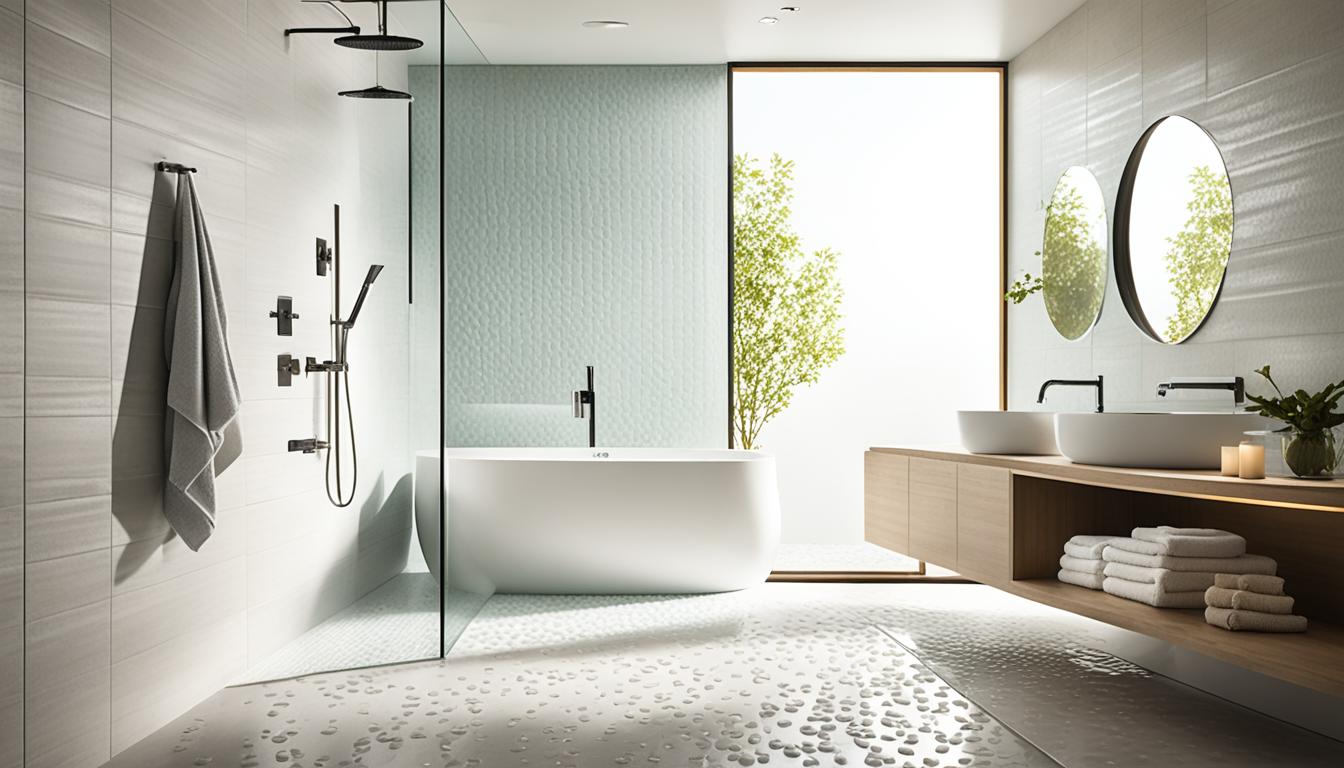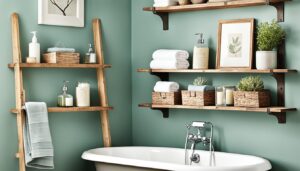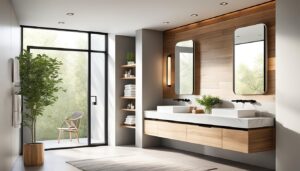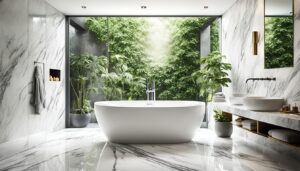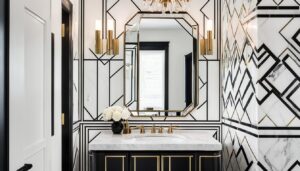Ever thought how the right bathroom floor can stop slips and falls? The flooring you pick greatly affects safety, especially where water’s a risk. Choosing slip-resistant flooring for your bathroom means less worry and more style. Let’s explore the top anti-slip bathroom flooring choices, where safety meets style.
Key Takeaways
- Anti-slip bathroom flooring is essential for minimizing slip hazards in wet areas.
- Safety floor coverings come in various styles to match your design preferences.
- Non-slip vinyl flooring is affordable and durable for heavy-traffic areas.
- Natural stone not only offers luxury but also provides excellent slip resistance.
- Options such as bamboo, cork, linoleum, and rubber offer unique benefits in anti-slip properties.
- Prioritizing safety does not have to compromise the stylish look of your bathroom space.
Why Safety is Crucial in Bathroom Flooring
Keeping the bathroom floor safe is a must because it’s always wet, making it easy to slip and fall. Getting the right bathroom safety solutions, like slip-resistant flooring, helps prevent accidents. This keeps everyone safe. It’s all about having floors that grip well to stop slips.
The Risks of Slippery Floors
Slippery floors in bathrooms are a real danger, leading to serious falls. With water around, you’re more likely to slip. That’s why it’s important to have flooring that prevents slipping. Floors with good traction offer grip and stability, making them safer.
Statistics on Bathroom Falls
Statistics show falling in the bathroom is a big problem. The CDC says many get hurt this way each year. Floors that don’t slip reduce these falls greatly. Homes with these floors see fewer accidents, proving their importance.
Understanding Anti-Slip Bathroom Flooring
Choosing the right flooring for your bathroom is essential. It’s especially true when you want safety and comfort. Anti-slip flooring in the bathroom helps to prevent falls. It provides functional benefits and peace of mind.
What Makes a Floor Slip-Resistant?
Slip-resistant floors are known for their textures that improve traction. These textures can range from subtle to pronounced. They ensure grip even if the floor is wet. Vinyl, rubber, and treated natural stones are common materials used. These are chosen for their ability to prevent slipping.
- Textured Patterns: Grooves and raised textures create friction.
- Anti-Slip Coatings: These applied coatings provide an extra layer of traction.
- Material Composition: Certain materials, like rubber or treated stone, naturally offer better grip.
Benefits of Anti-Slip Flooring
There are many reasons to install anti-slip flooring in bathrooms.
- Enhanced Safety: It lowers the chance of accidents. This is crucial for homes with kids or elderly members.
- Peace of Mind: A slip-proof bathroom brings comfort and assurance.
- Property Value: Anti-slip features can increase your home’s appeal. They make it more attractive to those who value safety.
- Aesthetic Appeal: Textured floors can add character and style. They enhance your bathroom’s look.
Anti-slip flooring makes your bathroom safer and more stylish. It turns it into a more reliable space. Here are some popular choices:
| Flooring Type | Primary Features | Examples |
|---|---|---|
| Vinyl | Water-resistant, easy to clean | Mohawk, Shaw |
| Rubber | High slip resistance, durable | FloorMuffler, Eco-Sport |
| Natural Stone | Textured surfaces, elegant | Travertine, Slate |
In summary, learning about anti-slip bathroom flooring options is key. It helps ensure a safe and visually appealing bathroom. These solutions lower risks while enhancing the space’s experience.
Top Non-Slip Vinyl Flooring Options
Choosing the best non-slip vinyl flooring for your bathroom is important. This material has many features and benefits. It’s perfect for any home.
Features and Benefits of Vinyl Flooring
Non-slip vinyl flooring is great for wet areas like bathrooms. It’s very tough and can handle lots of walking. This flooring often has extra padding too.
This padding makes it more comfortable and safer if you fall. Vinyl flooring also looks good, copying the style of pricier floors. So, you can keep your home safe and stylish.
Recommended Vinyl Products for Bathrooms
Selecting the right vinyl for your bathroom means looking at style and safety. Brands like Floor Crafters are top choices. They provide comfort and prevent slipping.
Adding textured floor surfaces to vinyl improves safety. This makes it good for families with kids or older people. Let’s compare some popular non-slip vinyl flooring options:
| Product | Key Features | Price Range |
|---|---|---|
| Floor Crafters Vinyl Planks | Built-in padding, water-resistant, textured surface | $3-$5 per sq. ft. |
| Armstrong Luxe Plank | Stone and wood-look designs, easy installation | $4-$7 per sq. ft. |
| Shaw Floorte Pro | High durability, anti-slip properties, cushioned layers | $5-$8 per sq. ft. |
Natural Stone Flooring for Bathrooms
Natural stone flooring is top-notch for bathrooms. It’s durable and looks great. It adds beauty and is also practical, offering slip resistance and a long life.
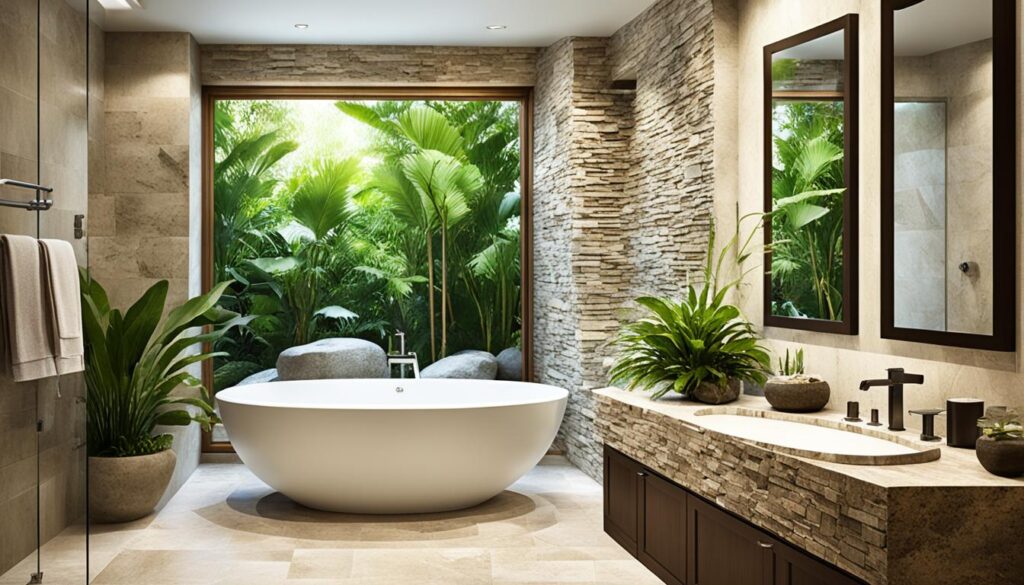
Advantages of Natural Stone
Natural stone has many benefits for bathroom floors. It’s durable, handling high traffic and moisture well. Plus, it can boost your home’s resale value with its luxury look.
Its design versatility is a big plus. Each stone piece is unique, making your space special. Natural stone with non-skid tiles makes bathrooms safer.
Types of Stone Textures for Slip-Resistance
To improve slip-resistance, there are techniques like sandblasting. It roughens the stone to reduce slips. Bush-hammering is another method, providing a uniform texture for wet areas.
Certain stones naturally resist slipping:
- Granite: It’s tough and a bit rough, offering slip-resistance and style.
- Marble: Usually shiny, but honing it makes it safer without sacrificing beauty.
- Slate: Its natural roughness adds excellent slip-resistance for damp places.
Choosing and treating natural stone wisely enhances your bathroom’s safety and look. Whether it’s granite, marble, or slate, using non-skid tiles can increase both the safety and elegance of your bathroom.
Bamboo and Cork Flooring
When looking at sustainable bathroom flooring options, think of bamboo and cork. They’re good for the planet and make your bathroom look special.
Bamboo flooring is tough and fights moisture well. It’s beautiful and good for Earth because bamboo grows back fast. It brings beauty to your room while caring for nature.
Cork flooring is quiet and soft to walk on. It keeps away mold and mildew, important for wet rooms. But, you need to keep the air moving to stop dampness.
Here are the main points about bamboo and cork floors:
| Feature | Bamboo Flooring | Cork Flooring |
|---|---|---|
| Eco-friendly | Yes | Yes |
| Durability | High | Moderate |
| Moisture Resistance | Good | Good, with proper ventilation |
| Noise Reduction | Moderate | High |
For the best results, get them installed and looked after correctly. Talking to experts like Floor Crafters is a smart move. They can guide you on how to keep your floors in top shape.
In short, bamboo flooring and cork flooring are great for those who want beauty and care about the planet.
Linoleum: A Classic Choice
When looking for durable and green flooring, linoleum is a top pick. It has changed a lot, mixing usefulness with a modern look. We’ll see why many homeowners, especially those wanting a green bathroom, choose linoleum.
Eco-Friendly and Water-Resistant
Linoleum is made from natural stuff like linseed oil, wood flour, and cork dust. This makes it a eco-friendly bathroom solution. It’s good for the planet, doesn’t give off nasty chemicals, and breaks down over time. Linoleum also resists water, perfect for damp bathrooms.
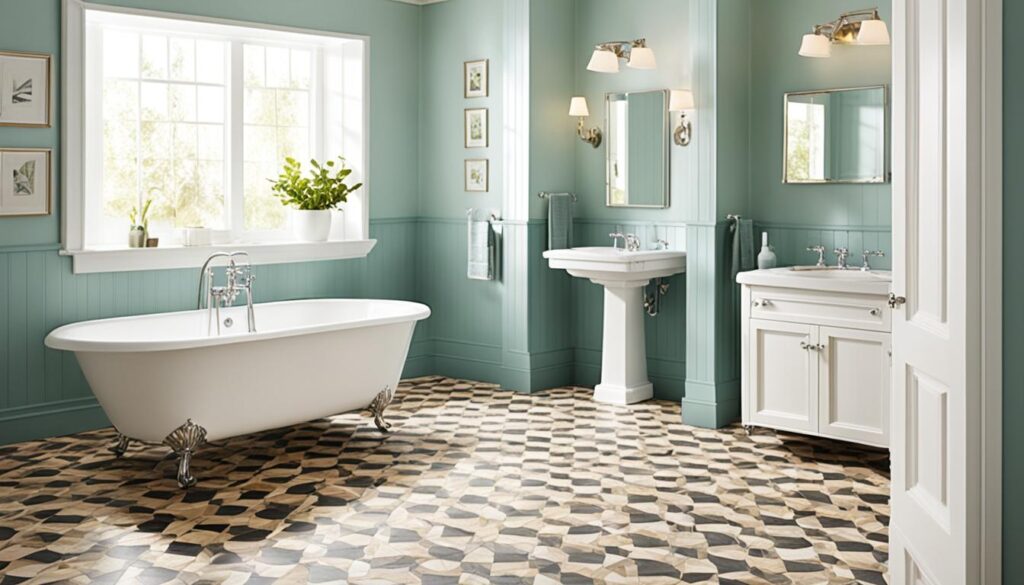
Modern Textured Linoleum Designs
Today’s linoleum isn’t like the old styles. It now has many textured looks that are not just nice to see but also make floors less slippery. This choice is smart and fashionable for updating bathroom floors. Plus, it’s easy to keep clean, staying beautiful and helpful as time goes on.
| Feature | Linoleum Flooring | Eco-Friendly Bathroom Solution |
|---|---|---|
| Material Composition | Natural (linseed oil, wood flour, cork dust) | Yes |
| Water Resistance | High | Yes |
| Slip Resistance | Enhanced by textured designs | Yes |
| Maintenance | Easy to clean | Yesтd> |
| Environmental Impact | Biodegradable | Positive |
Rubber Flooring: Extreme Safety
When choosing bathroom floors, rubber flooring shines as a top pick for safety. It’s often overlooked in design but offers unmatched safety benefits.
Rubber floors are known for their great grip, even when wet. This feature makes them perfect for bathrooms, where slips are typical. They also cushion falls, offering protection especially for seniors or kids.
While rubber floors might cost more, they’re worth it for their safety. They make environments safer and are easy to keep clean. This means they’re a smart choice for avoiding accidents for a long time.
| Feature | Rubber Flooring | Other Flooring Options |
|---|---|---|
| Traction | High, even when wet | Varies (often lower when wet) |
| Cushioning | Significant | Minimal to Moderate |
| Safety | Extreme safety flooring option | General safety |
| Cost | Higher | Varies (generally lower) |
| Maintenance | Minimal | Varies |
Rubber flooring is a standout for keeping people safe. It’s amazing how it offers grip and cushioning. It ranks top among the safest floor choices out there.
Anti-slip bathroom flooring
Ensuring safety in your bathroom starts with the right floor. Each non-slip material has its own benefits. We’ll compare these materials below.
Comparing Different Materials
Many materials can make your bathroom safer. Here is how they stack up:
| Material | Slip Resistance | Maintenance | Aesthetics | Cost |
|---|---|---|---|---|
| Porcelain/Ceramic | High, with texture | Low maintenance | Varied styles | Affordable |
| Natural Stone | Moderate, with sealant | Regular sealing needed | Luxurious | Expensive |
| Vinyl | High, with texture | Easy to maintain | Versatile designs | Budget-friendly |
| Bamboo | Moderate | Regular upkeep | Eco-friendly look | Moderate |
Choosing the Right Flooring for Your Needs
Choosing the right floor means weighing several factors. If you’re watching your budget, vinyl flooring is affordable and safe. For a luxury look, natural stone stands out but needs more care. Porcelain and ceramic are tough and come in many designs. Meanwhile, bamboo is great for those who prioritize the environment.
In the end, the best choice depends on your main concerns, whether it’s safety, looks, or cost. Evaluate your needs carefully to pick the best slip-resistant flooring. This will ensure your bathroom is both safe and attractive.
Conclusion
Picking the right floor for your bathroom is key for both safety and looks. Many materials are available, offering different benefits. Think about the needs of everyone in the home, how much effort you want to put into cleaning, and your style goals.
There’s an option for every type of bathroom, from non-slip vinyl to cork. Understanding the advantages of each can help you make the right pick. If you want extra safety, adding anti-slip mats can make floors safer and prevent falls.
Considering the good and bad of each choice will help make your bathroom safe and stylish. Choosing well can boost your home’s value too. With the right anti-slip floor, you can meet both your practical and design needs, making your bathroom both safe and appealing.


